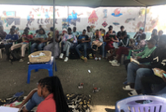In our everyday experience, glass is hard, brittle and breakable, but glass is actually made by melting sand and shaping it like liquid.
Some things in life seem unchangeable; they just will not bend. If we use all our strength, they only shatter in our hands and hurt us. But a skillful craftsman can make brittle things soft and malleable by preparing them appropriately, and taking decisive action at the right moment.
This proverb is often used to mean that you should take action quickly when an opportunity arises, so that you don't miss it. See also: There is a tide
There is a tide in the affairs of men,
Which, taken at the flood, leads on to fortune;
Omitted, all the voyage of their life
Is bound in shallows and in miseries.
- Brutus in Julius Caesar, Act 4, Scene 3 by William Shakespeare
Many cultures and languages have a proverb that is very similar to "Strike while the iron is hot." It seems likely that the proverb has multiple independent origins.
Chinese: 趁熱打鐵
Thai: ตีเหล็กเมื่อแดง
Hindi: लोहा गरम हैं. मार दो हथौड़ा.
Irish: buail an t-iarann te
Swahili: Fua chuma wakati kingali moto























